Helen H. Moore's Blog, page 704
July 29, 2016
An uncomfortable conversation we need to have: Is the U.S. spending too much money on the elderly?
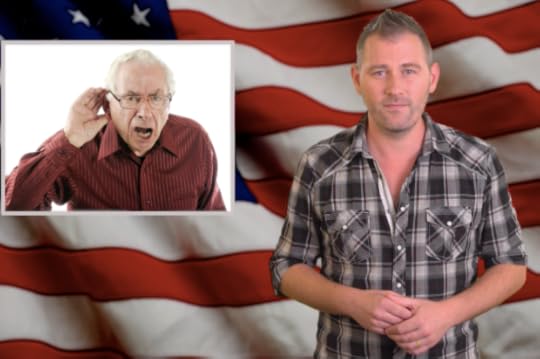
Medicare and Social Security are the bedrock programs of American liberalism, so why do so many liberals consider it taboo to even suggest adjusting these systems to ensure their sustainability for future generations?
We The People Live host Josh Zepps tackles this question of progressive orthodoxy in this original Salon video filmed at the Democratic National Convention in Philadelphia.
Zepps says America’s resource allocation is in need of a serious reexamination: “Medicare costs more than $500 billion per annum, 30 percent of which is spent on the five percent of beneficiaries who die each year. One third of that is spent on the final month of life. The final month. I mean, you want to talk about priorities, let’s just take that one datum. More than $50 million each year spent on the final month of life.”
“The left needs to reckon with the uncomfortable truth that what this country is doing is sapping the vitality of the young and pumping it into the elderly,” he says. “It is a gigantic resources Hoover from young professionals into old retirees.”
Zepps also has a message for those who would change the topic by pointing to other items in the federal budget that could use cutting: “This isn’t a conversation about why other people are wrong. We do enough of that. This is a conversation about how we can improve ourselves, by admitting things we tend to refuse to admit.”
Watch the full clip above.
July 28, 2016
“Can’t see Hillary in that white suit & not think of suffragists who dressed entirely in white”: Twitter reacts to Hillary Clinton’s historic DNC acceptance speech
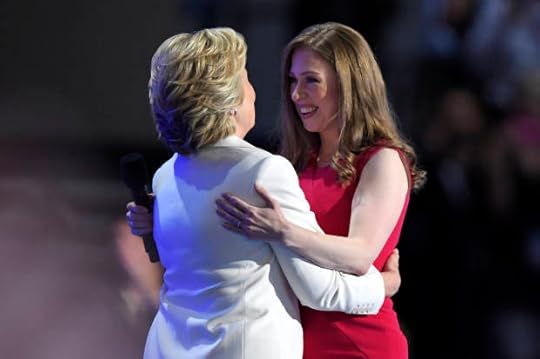
Chelsea Clinton, embraces her mother, Democratic presidential nominee Hillary Clinton, during the final day of the Democratic National Convention in Philadelphia , Thursday, July 28, 2016. (AP Photo/Mark J. Terrill) (Credit: AP)
Hillary Clinton accepted the Democratic Party’s presidential nomination Thursday night in Philadelphia, becoming the first woman to head a major party’s ticket.
Clinton’s speech at the Democratic National Convention was a traditional closing argument presenting a mix of hopeful policy goals and criticism of the opposition, standing in contrast to the overwhelmingly negative acceptance delivered by Republican nominee Donald Trump a week earlier.
Chelsea Clinton introduced her mother to the Democratic delegation:
VIDEO: Hillary Clinton takes the stage to accept the Democratic nomination https://t.co/4RfEj9bX5z #DemsinPhillyhttps://t.co/ggXlVINW6b
— The Boston Globe (@BostonGlobe) July 29, 2016
Can't see Hillary in that white suit & not think of suffragists who dressed entirely in white. #DemsInPhilly pic.twitter.com/Ohc83IDpyy
— Shelby Knox (@ShelbyKnox) July 29, 2016
Early in her speech, Clinton thanked her primary opponent Bernie Sanders, saying that his “campaign inspired millions of Americans, particularly the young people who threw their hearts and souls into our primary.” Cameras caught Sanders’ underwhelming reaction, which quickly attracted the attention of the internet:
Hillary Clinton: "Bernie, your campaign inspired millions of Americans…Your cause is our cause." pic.twitter.com/p8xAFZTVSX
— POLITICO (@politico) July 29, 2016
idk there’s a lotta buzz around bernie pic.twitter.com/3VwRmwadEK
— Jack Mirkinson (@jackmirkinson) July 29, 2016
I hope Bernie slumped in a chair looking like a guy whose wife just dragged him to a Broadway musical isn't our last image of him.
— Mark Harris (@MarkHarrisNYC) July 29, 2016
Bernie ordered that soup 30 minutes ago and it still hasn't arrived.
— Jonathan Chait (@jonathanchait) July 29, 2016
Turning to Republican nominee Donald Trump, Clinton invoked President Franklin Delano Roosevelt’s famous quote: “The only thing we have to fear is fear itself.”
FDR rewritten: "The only thing we have to fear is Trump itself."
— Harry Shearer (@theharryshearer) July 25, 2016
“I will be a President for Democrats, Republicans, and Independents,” Clinton declared. “For the struggling, the striving and the successful. For those who vote for me and those who don’t. For all Americans.”
Democrats are starting to make this election not Clinton vs. Trump but America vs. Trump
— Taegan Goddard (@politicalwire) July 29, 2016
In contrast to Trump’s RNC acceptance speech, which was notably light on policy, Clinton spent the middle portion of her speech delving into the details of the plans she hopes to implement as president regarding student debt, foreign policy, and gun control.
Clinton: No wonder [Trump] doesn't like talking about his plans. You might have noticed I like talking about mine." pic.twitter.com/f4aYpS5ReC
— BuzzFeed News (@BuzzFeedNews) July 29, 2016
Ugh. All these SPECIFICS on how she'll fix problems. Can't she just say, "Buh-leeve me" and "It'll be great." #DemsinPhilly
— Patton Oswalt (@pattonoswalt) July 29, 2016
There's actual policy in Clinton speech. Not Trump's.
Q is do people care. Or believe.
— ian bremmer (@ianbremmer) July 29, 2016
Clinton makes appeal to #BernieSanders supporters with nods to debt-free college tuition #DNCinPHL pic.twitter.com/vrdjcondsZ
— Phaedra Trethan (@CP_Phaedra) July 29, 2016
Hillary campaigns in prose, while promising to govern in prose.
— Franklin Foer (@FranklinFoer) July 29, 2016
Hillary’s progressive laundry list should have been cut from this speech to get center-right voters who hate Trump. She lost them.
— Erick Erickson (@EWErickson) July 29, 2016
Turning back to Trump, Clinton questioned whether the Republican nominee’s temperament was suited to the presidency. “Imagine him in the Oval Office facing a real crisis,” she said. “A man you can bait with a tweet is not a man we can trust with nuclear weapons.”
Masterful rhetorical move here: if Trump goes off on Twitter after this speech, he proves Clinton's point
— Anne Helen Petersen (@annehelen) July 29, 2016
Somewhere, a terrified aide is locked in a bathroom with Trump's phone as he beats on the door.
— Jon Lovett (@jonlovett) July 29, 2016
Trump may be channeling Nixon and "Law & Order" but Clinton has a bit of LBJ questioning Goldwater's finger on the button #DemsInPhilly
— Steven Rattner (@SteveRattner) July 29, 2016
Trump, however, couldn’t help himself, firing off a string of tweets immediately after Clinton’s speech.
Hillary's refusal to mention Radical Islam, as she pushes a 550% increase in refugees, is more proof that she is unfit to lead the country.
— Donald J. Trump (@realDonaldTrump) July 29, 2016
Our way of life is under threat by Radical Islam and Hillary Clinton cannot even bring herself to say the words.
— Donald J. Trump (@realDonaldTrump) July 29, 2016
Hillary will never reform Wall Street. She is owned by Wall Street!
— Donald J. Trump (@realDonaldTrump) July 29, 2016
Hillary's vision is a borderless world where working people have no power, no jobs, no safety.
— Donald J. Trump (@realDonaldTrump) July 29, 2016
Hillary's wars in the Middle East have unleashed destruction, terrorism and ISIS across the world.
— Donald J. Trump (@realDonaldTrump) July 29, 2016
More notable than anything Clinton said in her speech, however, was the historical weight of the moment:
No matter your political leanings, this is a moment. pic.twitter.com/A000bxxm9y
— Amanda Wills (@AmandaWills) July 29, 2016
So anyway, some history. pic.twitter.com/80NWvII5Le
— DENALI (@timothypmurphy) July 29, 2016
Hillary Clinton accepts Democratic nomination: “We must stand up to bullies”
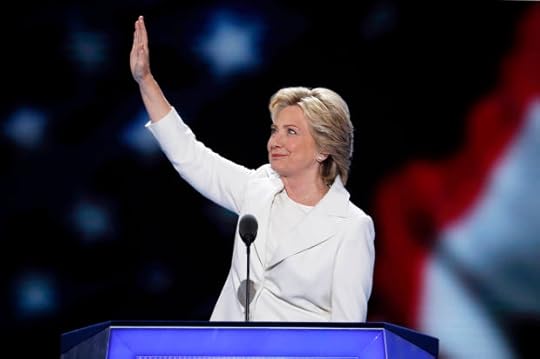
Democratic presidential nominee Hillary Clinton waves to delegates before speaking during the final day of the Democratic National Convention in Philadelphia , Thursday, July 28, 2016. (AP Photo/J. Scott Applewhite) (Credit: AP)
PHILADELPHIA (AP) — Promising Americans a steady hand, Hillary Clinton cast herself Thursday night as a unifier for divided times, an experienced leader steeled for a volatile world. She aggressively challenged Republican Donald Trump’s ability to do the same.
“Imagine him in the Oval Office facing a real crisis,” Clinton said as she accepted the Democratic nomination for president. “A man you can bait with a tweet is not a man we can trust with nuclear weapons.”
Clinton took the stage to roaring applause from flag-waving delegates on the final night of the Democratic convention, relishing her nomination as the first woman to lead a major U.S. political party. But her real audience was the millions of voters watching at home, many of whom may welcome her experience as secretary of state senator and first lady, but question her character.
She acknowledged those concerns briefly, saying “I get it that some people just don’t know what to make of me.” But her primary focus was persuading Americans to not be seduced by Trump’s vague promises to restore economic security and fend off threats from abroad.
Clinton’s four-day convention began with efforts to shore up liberals who backed Bernie Sanders in the Democratic primary and it ended with an outstretched hand to Republicans and independents unnerved by Trump. A parade of military leaders, law enforcement officials and Republicans took the stage ahead of Clinton to endorse her in the general election contest with Trump.
“This is the moment, this is the opportunity for our future,” said retired Marine Gen. John R. Allen, a former commander in Afghanistan. “We must seize this moment to elect Hillary Clinton as president of the United States of America.”
American flags waved in the stands of the packed convention hall. There were persistent but scattered calls of “No more war,” but the crowd drowned them out with chants of “Hill-a-ry” and “U-S-A!”
The Democratic nomination now officially hers, Clinton has just over three months to persuade Americans that Trump is unfit for the Oval Office and overcome the visceral connection he has with some voters in a way the Democratic nominee does not.
She embraced her reputation as a studious wonk, a politician more comfortable with policy proposals than rhetorical flourishes. “I sweat the details of policy,” she said.
Clinton’s proposals are an extension of President Barack Obama’s two terms in office: tackling climate change, overhauling the nation’s fractured immigration laws, and restricting access to guns. She disputed Trump’s assertion that she wants to repeal the Second Amendment, saying “I’m not here to take away your guns. I just don’t want you to be shot by someone who shouldn’t have a gun in the first place.”
Campaigning in Iowa Thursday, Trump said there were “a lot of lies being told” at Clinton’s convention. In an earlier statement, he accused Democrats of living in a “fantasy world,” ignoring economic and security troubles as well as Clinton’s controversial email use at the State Department.
The FBI’s investigation into Clinton’s use of a private internet server didn’t result in criminal charges, but it did appear to deepen voters’ concerns with her honesty and trustworthiness. A separate pre-convention controversy over hacked Democratic Party emails showing favoritism for Clinton in the primary threatens to deepen the perception that Clinton prefers to play by her own rules.
Through four nights of polished convention pageantry, Democratic heavyweights told a different story about Clinton. The most powerful validation came Wednesday night from Obama, her victorious primary rival in 2008. Obama declared Clinton not only can defeat Trump’s “deeply pessimistic vision” but also realize the “promise of this great nation.”
Clinton was introduced by her daughter, Chelsea, who spoke warmly of her mother as a woman “driven by compassion, by faith, by kindness, a fierce sense of justice, and a heart full of love.” President Bill Clinton watched from a seat on the convention floor, beaming with pride and repeatedly leaping to his feet.
Clinton was joined on stage at the end of the night by her running mate, Virginia Sen. Tim Kaine, who addressed the convention Wednesday. Fireworks exploded inside the arena and red, white and blue balloons plunged from the arena rafters.
Clinton and Kaine head into the general election seeking support from the same coalition of voters that propelled Obama into the White House: blacks, Hispanics, women and young people. The diverse parade of speakers who took the stage in Philadelphia this week underscored that goal.
On the convention’s closing night, Khizr Khan, an American Muslim whose son was killed in military service, emotionally implored voters to stop Trump, who has called for a temporary ban on Muslim immigration.
“Donald Trump, you are asking Americans to trust you with their future,” Khan said. “Let me ask you, have you even read the United States Constitution? I will gladly lend you my copy.”
The program paid tribute to law enforcement officers killed on duty, including five who died in Dallas earlier this month in retaliation for officer-involved shootings in Minnesota and Louisiana.
“Violence is not the answer,” Dallas Sheriff Lupe Valdez said. “Yelling, screaming and calling each other names is not going to do it.”
Clinton sought to reach beyond the Democratic base, particularly to moderate Republicans unnerved by Trump.
Former Reagan administration official Doug Elmets announced he was casting his first vote for a Democrat in November, and urged other Republicans who “believe loyalty to our country is more important than loyalty to party” to do the same.
Jane Austen and Facetime with Charlotte: Chelsea Clinton’s personal tales humanize her mother at DNC
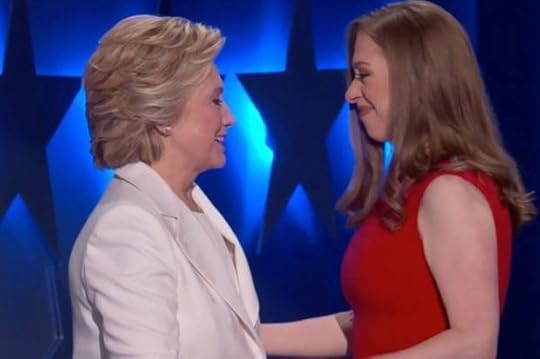
Poised to become the first person in American history to have both parents serve as President of the United States, Chelsea Clinton delivered her much-anticipated introductory speech of her mother Hillary on the final night of the Democratic National Convention Thursday.
“I’m here as a proud American, a proud Democrat, a proud mother,” the only daughter of the former president and former secretary of state said. “A very, very proud daughter.”
“This November, I’m voting for a woman who is my role model as my mother and as an advocate,” Chelsea said of her mother.
Tasked with the daunting task of softening one of the most historically disliked presidential nominee’s in modern U.S. history, Chelsea used personal tales to humanize her mother.
Her mother, Chelsea said, will drop everything even on the campaign trail “for a few minutes of blowing kisses and reading ‘Chugga- Chugga Choo-Choo’ with her granddaughter.”
“Everyday I spend as Charlotte and Aidan’s mother, I think about my own mother – my wonderful, kind, thoughtful hilarious mother,” Chelsea continued.
“My earliest memory is my mom picking me up after I’d fallen down, giving me a big hug, and reading me ‘Goodnight Moon,’” Chelsea told the crowd. “From that moment to this one, every single memory I have with my mom is that regardless of what’s happening in her life, she was always, always there for me.”
“She left notes for me to open every day when I was gone,” Chelsea told the crowd. “I treasured each and every one of those notes. They were always a reminder that I was always in her thoughts and in her heart.”
“As a kid, I was kind of obsessed with dinosaurs,” Chelsea joked, adding that on Saturdays they loved “making up stories about what we’d ever do if we met a triceratops.”
“There’s something else my mother taught me: Public service is about service.”
“I loved that my parents expected me to have opinions and to be able to back them up with facts,” Clinton said. “I never once doubted that my parents cared about my thoughts and my ideas, and I always, always knew how deeply they loved me. That feeling of being valued and loved, that’s what my mom wants for every child.”
“I hope that someday my children will be as proud of me as I am of my mom.” Chelsea said to end her speech.
“And Mom, Grandma would be so, so proud of you tonight.”
WATCH: Father of fallen U.S. Muslim soldier trolls Trump with a copy of his pocket Constitution at DNC
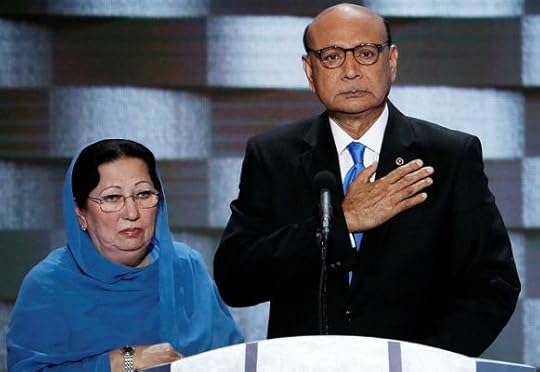
(Credit: AP)
“We are proud to stand here as parents of Captain Khan and as proud American Muslims,” the father of a fallen U.S. solider said Thursday night.
Khzir Khan stood with his wife ,Ghazala, on stage at the Wells Fargo Center in Philadelphia to deliver the most powerful statement of the entire Democratic National Convention: Donald Trump’s campaign of bigotry will not define the spirit of this nation.
“Hillary Clinton was right when she called my son the best of America,” Khan said of his son, who was only 27 when he was killed by a suicide bomber in Iraq in June 2004.
“Our son had dreams too,” Khan’s father told the gathered Democrats, “but he put those dreams aside the day he sacrificed his life.”
“Donald Trump, you have sacrificed nothing,” Khan then said, turning his attention to the Republican presidential nominee.
“Donald Trump you are asking Americans to trust you with their future.
“Let me ask you,” Khan continued. “Have you even read the United States Constitution?”
“I will gladly lend you my copy!” Khan said, pulling out his pocket Constitution:
Kareem Abdul-Jabbar slams Trump by introducing himself as “Michael Jordan”: “I said that because I knew Donald couldn’t tell the difference”
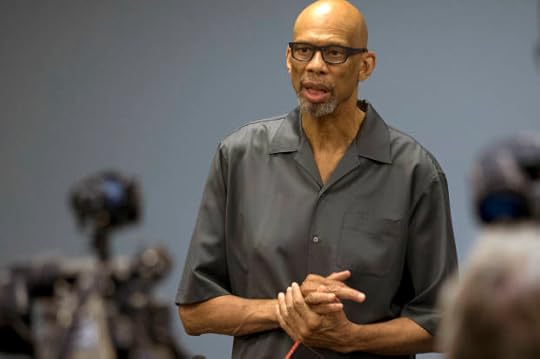
FILE - In this July 9, 2015, file photo, basketball legend Kareem Abdul-Jabbar speaks during a news conference in Los Angeles. The death of Muhammad Ali last week sent Abdul-Jabbar, the NBA's all-time scoring leader, and Jim Brown, a four-time NFL MVP, strolling down memory lane, back to June 4, 1967 and a sunny day that they spent together in Cleveland. (AP Photo/Jae C. Hong, File) (Credit: AP)
Basketball legend Kareem Abdul-Jabbar strode on-stage at the Democratic National Convention and informed the crowd that he was “Michael Jordan,” and that he was there to support Hillary Clinton.
The crowd initially seemed confused by his comment, until he explained that “I said that because I knew Donald Trump couldn’t tell the difference.”
Abdul-Jabbar then launched into a moving speech about Muslims serving in the armed forces, including Captain Humayan Khan, who died in service after 9/11. His family had emigrated from the United Arab Emirates, and Abdul-Jabbar claimed that the kind of ban on Muslim immigration that Trump proposes is “the very kind of tyranny [Thomas] Jefferson abhorred.”
He compared Jefferson’s defense of religious freedom to “the ‘religious freedom’ acts like those signed by [Trump running mate] Mike Pence, which are the very opposite, because they encourage religious discrimination.”
“At [their] core, such acts are the result of fear,” he said, concluding that Americans need to stand up and say “not here, not ever.”
Civil rights advocate Rev. Dr. William Barber: Faith shouldn’t be used “to serve hate, fear, racism, and greed”
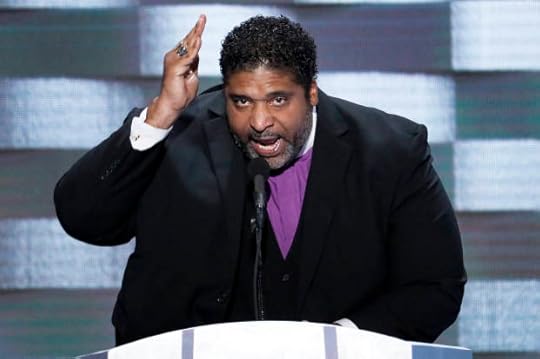
Rev. William Barber speaks during the final day of the Democratic National Convention in Philadelphia , Thursday, July 28, 2016. (Credit: AP Photo/J. Scott Applewhite)
Civil rights activist Reverend Dr. William Barber II brought down the house with his sermonic speech on the fourth night of the Democratic National Convention on Thursday. Heavily referencing scripture, Barber pleaded with Americans to practice racial and ideological inclusion.
“I don’t come tonight representing any organization,” Barber said. “But I’ve come to talk about faith and morality … I know it may sound strange, but I’m a conservative because I work to conserve a divine tradition that teaches us to do justice, love mercy, and walk humbly with our god.”
Barber said he’s concerned with “people who say so much about what God says so little, while saying so little about God says so much.”
“In my heart, I’m troubled,” he said. “And I’m worried by the way faith is cynically used by some to serve hate, fear, racism, and greed … And when religion is used to camouflage meanness, we know that we have a heart problem in America.”
“I say to you tonight that some issues are not left versus right or liberal versus conservative,” he added. “They are right versus wrong.”
“We want a progressive party that speaks to us”: DNC protesters in their own words
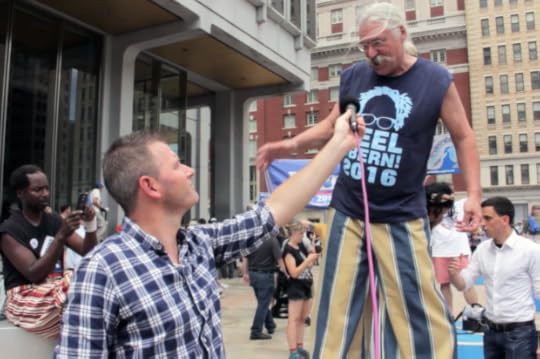
Protesters, fueled largely by the anti-establishment vigor of Bernie Sanders’ insurgent campaign, flooded Philadelphia this week for the Democratic National Convention. As of Thursday morning, the mostly peaceful protests had resulted in 103 citations and 11 arrests.
In an original video for Salon, We The People Live host Josh Zepps took the the streets to take the pulse of the anti-Clinton crowd. The atmosphere Zepps found around Philadelphia’s City Hall was somewhere between a political rally and the parking lot of a Grateful Dead show, complete with David Crosby lookalikes on stilts, shirtless children playing bongos, and members of the Revolutionary Communist Party.
Watch the full video above to hear protesters explain why they won’t support Hillary Clinton in the general election and who they’ll be voting for instead.
We’re not even at Peak Drake yet: This is what celebrity looks like in an era where we want more for less
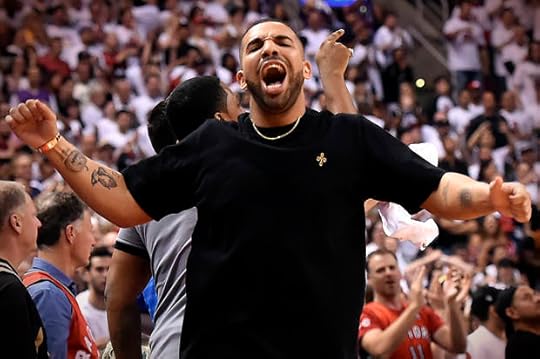
Drake (Credit: Reuters/Dan Hamilton)
For being the saddest man in rap music, Drake sure does have a lot to celebrate.
The rapper (née Aubrey Graham) celebrates a mammoth 11th week atop the Billboard for “Views,” his fourth proper studio album. That’s the longest such run by a male artist in 24 years, since Billy Ray Cyrus’ “Some Gave All” back in 1994. (You might remember it as the record that launched “Achy Breaky Heart,” the syrupy country ballad America still can’t wipe from its brains.) Graham has additionally spent 22 weeks atop the Hot 100, despite the fact that we’re only 30 weeks into the year. First, there was “Work” (9 weeks), the lead single off Rihanna’s “ANTI,” and then “One Dance” (10 weeks), which was recently dethroned by Sia’s first chart-topper “Cheap Thrills.”
Drake’s success is unprecedented: He’s one of the few artists to have both the number-one album and the number-one song for 10 weeks, as well as holding the record for the most tracks to chart on the Hot 100. In May, he shattered the previous benchmark, held by Justin Bieber of all people, with 20 songs on Billboard at the same time.
In the streaming age, that kind of chart ubiquity often signifies that an artist just dropped an album, like when all of the tracks from Beyoncé’s “Lemonade” appeared on the Hot 100 the week following its surprise release. What’s unusual is that nearly three months after “Views” dropped, 10 Drake tunes are still charting—which include “Controlla” (no. 18), “Too Good” (no. 20), “Pop Style” (no. 72), and “Child’s Play” (no 92). He also enters the Hot 100 as a guest on DJ Khaled’s “For Free” (no. 19), the aforementioned “Work” (no. 23), and French Montana’s “No Shopping,” among others.
Such domination is both an incredible achievement and utterly exhausting. The artist who originally came to fame playing a wheelchair-bound middle-schooler on TV’s “Degrassi” has promised to drop another mixtape this summer. This will be his fourth release in just two years, following two successful EPs released in 2015: “If You’re Reading This It’s Too Late” and “What a Time to Be Alive,” the latter a collaboration with the rapper Future. To release any more songs at this point is more of a threat than a promise.
Drake’s current output is dramatically redefining the limits of overexposure in an era where we demand increasing amounts of content from celebrities. To be a musician of Drake’s caliber is not merely a matter of working on material, polishing it in the studio, and putting it out once every few years. It entails a steady flow of viral bait that amounts to a PR onslaught—appearing on “Saturday Night Live,” going through the motions of your own celebrity feud, and maybe even becoming a meme or two (see: “Drake-ing Bad,” which is precisely whatever you think it is). Drake, perhaps more than any celebrity of his era, understands the economics of fame in an age where we want more from celebrities for less.
That savvy has served him well in the past. “Hotline Bling,” the lead single off “Views,” features a video that was designed to be endlessly GIFed. Helmed by the ridiculously named Director X (he’s big in Canada), the five-minute segment features Drake, wearing an owl sweatshirt, slow-jamming against a series of monochromatic backgrounds. The mise en scène is like a cotton-candy “Tron: Legacy” filtered through his emo musings on female autonomy. That video has been viewed nearly a billion times.
The massive commercial and critical success of “Hotline Bling,” tapped as the winner of the prestigious Pazz and Jop poll in 2015, announced the dawn of Drakemania. Drake, of course, had always been successful. His first-ever track on the charts, the comic and playful “Best I Ever Had,” reached no. 2, while its parent LP also peaked at the sophomore slot on the album charts. But while announcing a new peak in his creative gifts, 2015 also defined his release strategy: When the surprise release “If You’re Reading This It’s Too Late” dropped on Billboard, every single track charted. During the record’s first week in stores (or wherever people buy albums these days), Drake may as well have owned the music industry.
The first act to flirt with that kind of success was The Beatles, the U.K. rock-and-roll group that made a nation threaten to lock up its teenage girls when the “British Invasion” came to America in 1964. On April 4, the Paul McCartney-fronted band boasted the top 5 songs on the Billboard Hot 100: “Can’t Buy Me Love,” “Twist and Shout,” “She Loves You,” “I Want to Hold Your Hand,” and “Please Please Me.” To capitalize on that success, The Beatles released nine LPs and EPs that year, unfathomable today.
In a biography of Frank Sinatra, Spencer Leigh notes that The Beatles’ releasing strategy broke every rule of how pop acts are usually promoted. “No record company wants to promote more than four or five singles by the same act in a year,” Leigh writes in “An Extraordinary Life.” “What took place was saturation marketing gone bezerk and any promotion man would fear that the public had been turned off by the over-exposure.” Although the group is revered today, that’s precisely what began to happen. In announcing The Beatles’ record-breaking chart success, Billboard moaned, “Just about everyone is tired of the Beatles.”
At their peak powers, many artists have pumped out a massive volume of content. Between 1979 and 1985, The Cure released a new album nearly every year. Guided by Voices put out nine records in the ‘90s and hasn’t slowed down since. The Ohio-based group, which consists of Robert Pollard and whoever can stand to be around him at the time, debuted six albums between 2012 and 2014. Another just hit stores this April. Until recently, Rihanna followed the same strategy. Starting with 2005’s “Music of the Sun,” the Barbados-born singer churned out seven albums in seven years, which included “Loud,” “Rated R,” “Unapologetic,” and “Good Girl Gone Bad.”
Quantity doesn’t always mean sacrificing quality—until it does. Although The Cure released “Pornography,” the band’s darkest effort, during its prolific period in the early ‘80s, Rihanna’s actual albums have often felt perfunctory, a kind of necessary evil. Rihanna has spent more weeks atop the Billboard Hot 100 than any artist not named Mariah Carey, but until 2012, she’d never had a chart-topping record.
The four-year break Rihanna took making “ANTI” did a great deal to change that. The singer has often been viewed as more of a singles machine than an album artist — the kind of musician who can deliver an accomplished, fully fleshed-out production. “ANTI,” though, hints at a more thoughtful and reflective side of Rihanna, especially on tracks like the gospel-influenced “Higher,” which showed off the increasingly impressive vocal range she displayed on “FourFiveSeconds,” and the synth-rock ballad “Kiss It Better.” Rather than pushing through yet another record at any cost, the singer spent years tinkering with the production and tossing out songs that didn’t work. That dedication shows.
Drake’s recent work, in contrast, has been mired by a feeling of redundancy. There’s little on “Views,” his worst-reviewed album to date, that Graham didn’t express on either of the mixtapes he released last year—monotonous feelings of longing for an anonymous and unattainable girl, the shapely silhouettes he chases in “Hotline Bling.” As Slate’s Jack Hamilton points out, there were multiple tracks on “Nothing Was the Same,” considered by many to be his best album to date, devoted to the emotional etiquette of texting.
The artist’s relentless need to stay on top at the expense of his artistry isn’t just a matter of braggadocio, despite what he claims on “Forever.” (“Last name greatest, first name ever.”) It’s also a matter of economics. “The album as a format isn’t as important as it once was,” writes The Guardian’s Derrick Rossignol. “Music sales don’t bring in the kind of money that they used to, so they have effectively become another piece of merchandise, like a concert T-shirt or a tour poster. Bands don’t sell their music anymore: They sell themselves.” That’s why Beach House put out two albums in 2015 (“Depression Cherry” and “Thank Your Lucky Stars”), as did Death Grips and Mac DeMarco.
Rossignol is right: Services like Spotify and Apple Music have completely changed the model of how artists make money in an era driven by streaming platforms. When promoting “ANTI,” Rihanna even gave away a million free copies of the record as part of a licensing deal through Samsung. Unless you’re Adele, who markets to the one group who still manages to buy music the old-fashioned way (e.g., the elderly), you have to make your own rules—like Rihanna—or play a game someone else controls.
That’s perhaps why Drake isn’t just the voice behind every song on the radio. He’s absolutely everywhere. Graham has his own whiskey company. He starred in a Sprite commercial, in which he struggles to sing “Forever” before taking a sip of an ice-cold cola, thus finding his voice. Drake also has been at the center of campaigns for Nike Air Jordan and a T-Mobile commercial that aired during the Super Bowl. He even popped up in “Anchorman 2” and “Ice Age: Continental Drift.” In the latter, he appears with two other musicians who were just there for the paycheck—Nicki Minaj and Jennifer Lopez. Most recently, Graham took time out of his schedule made to get in the middle of the Kanye West-Taylor Swift feud.
If you think we’ve reached peak Drake, Aubrey Graham is clearly just getting started.
If you have to ask: “How To Tell You’re a Douchebag” filmmaker on making his Twitter-era rom-com
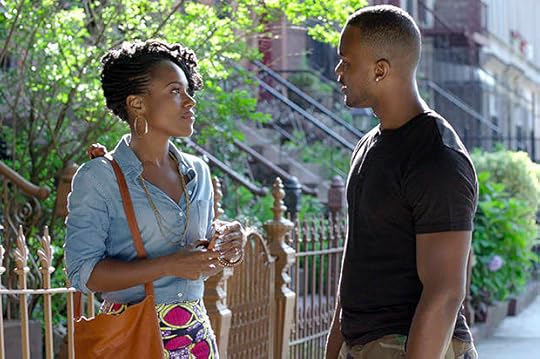
"How to Tell You're a Douchebag"
“How to Tell You’re a Douchebag,” an enjoyable romantic comedy written and directed by Tahir Jetter, opened at Sundance earlier this year. It’s a timely indie comedy about Ray (Charles Brice), a Brooklyn blogger who, according to one female character, is “a self-centered, juvenile womanizer.” She’s not wrong — Ray has been sleeping with a series of women after his girlfriend dumped him for another woman when he proposed. The situation left Ray, who believes in true love, “emotionally unavailable.” That is, until he meets Rochelle Marseillles (DeWanda Wise), a successful Internet writer in her own right. Rochelle isn’t impressed by Ray’s looks and charms, nor is she interested in him … or is she? (It’s a rom-com, of course.) As Ray’s best friend Jake (the superb William Jackson Harper) observes, Ray has “the audacity of hope” as he tries to show Rochelle that he’s not a douchebag.
Jetter spoke via Skype about his fine film and his experiences making “How To Tell You’re a Douchebag,” which drops on iTunes Friday.
There are too few romantic comedies starring and directed by African Americans. How did you come up with the story, and play with the rom-com tropes?
It came from my reflections on my personal life and my poor decisions dating and pursuing people. After one particular relationship failed, I decided I needed to look inward and make a commentary on my behavior. How silly expectations I had and developed about how things should have gone—that is, they should have gone my way. I’ve been active on Twitter and there’s a level of discourse where you get insights into women that you wouldn’t get otherwise: black women complaining about male entitlement. So looking at the internet and my own behavior, I thought I’d retool the “man pursues woman” love story and give it a self-aware ethos. This is more of a coming-of-age story of a man approaching a greater sense of self-awareness than how he’s treating people in relationships. It’s also about how fleeting and transient millennial relationships are. We are quick to dismiss or discard people because we think we have more access to people, but we do want to be in relationships, and engage with others in meaningful ways. We want the freedom of being single while pursuing monogamy, and there’s inherent comedy in that way. Internet dating is still uncomfortable and bizarre, but those of us who are in and around our 30s, there’s the consciousness of obscuring ourselves behind a digital personality and being ourselves. The cowardliness of hiding behind a digital persona, and how we trash and deride people as well as how we relate as millennials.
Do you think, as Ray says in one of his comic moments, that “black women are hostile to black men in cities?”
That was more of a troll question meant to suggest Ray is a douchebag. He’s mocking Rochelle in a way that even he doesn’t believe, but he’s confident that he can get a rise out of her in that scene. It speaks to how black men get on black women’s nerves. We can see how black women bring up causes, and black men will troll them for it. That scene is a representation of that tug-of-war that we experience. We are our privilege to a certain extent. Ray is aware that he’s good looking, a ladies’ man, and well-spoken, but that’s his charm to a fault. I wanted to see the paradigm of this man not getting what he wants, what that means and feels like, but in a larger sense, the film is about how everyone doesn’t get what they want in the modern dating milieu. Sometimes things don’t go your way.
Let’s talk about the characters. Ray is a player who wants to be better; he’s a likeable jerk. Did you worry about making him too unlikable?
I do think the likability comes from the fact that despite his looks and charm, he’s a bumbling person and that makes him endearing and human. I wasn’t worried about making him unlikable; he was interesting. I gravitate to films that are about [flawed] characters. I know a lot of men who saw the film who said they acted just like that, and saw a lot of themselves in Ray. Or women who said they were one of those women.
In contrast, Rochelle is an independent spirit who speaks truth to power. But she has her own issues (that should not be revealed). Can you talk about how you avoided black female stereotypes?
I have seen a lot of romantic comedies. The trope of a black woman is professional, haughty, and self-possessed. They often don’t have flaws as in films like “Soul Food” or “Something New.” Rochelle wants what she doesn’t have. To her, that’s a stable relationship, or a moment where she can be by herself, as she gets to the next stage of her personal and professional life. Her anger and indignation was very real. I read that on the internet all the time. I wanted her to be a human and have her feel she is lacking something and explore that within the conventions of this small movie.
The romantic leads are both writers. Language is very specific in the film, particularly when one of Ray’s ladies asks him “How do you feel about me,” which he understands as “What do you think about me.” Can you talk about how you used words so precisely? Rochelle is particularly verbal.
I looked at a lot of Woody Allen and “High Fidelity,” which is precise and particular of how the main character describes his perception of the world. It’s a low-budget film so people are going to latch on to the dialogue, and I wanted Rochelle to sound like one of the talented women writers on Twitter who has thousands of followers and can rattle off a dissertation at will. I wanted to make Ray sound much more banal as a writer, one who does navel-gazing think pieces about their own lives that are silly, but can make a name for yourself and a living. He wants to be a good writer. What attracts him to Rochelle aside from her demeanor and poise is that she can actually write a novel. I was intent on trying to convey that, and how these characters spoke to each other.
What can you say about the challenges of getting an independent African American film made and screened? Your film played Sundance.
I was fortunate enough to get into Sundance. All the money I got to make this film [the budget was under $1 million] was from family and friends. I had the goal of getting into Sundance because it’s a great market and showcase, and supportive of indie films. But when you make a feature, you have to make money back if you want to make another film. We earned our money back because we were able to screen at Sundance. If you don’t get into Sundance, SXSW or Tribeca, it’s hard to get distribution. When you make an indie film with a movie made for a niche audience, it’s a real gamble. But I think the producers wanted to give this film the best push. You won’t see anything like this in Hollywood.



